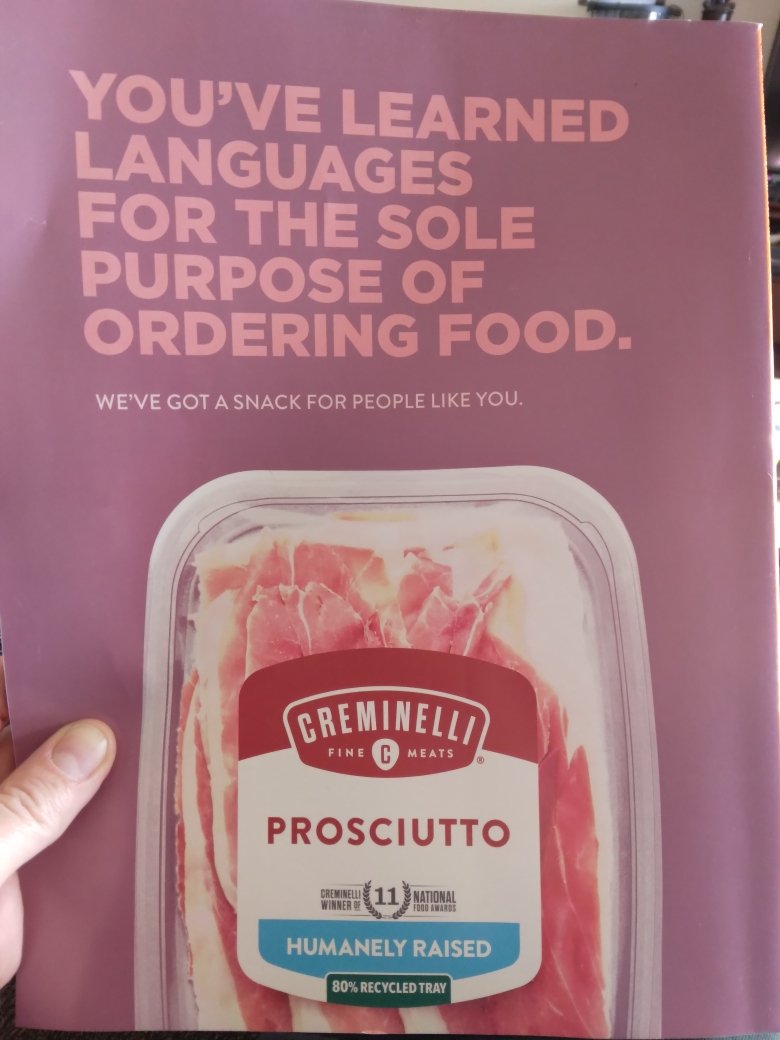Following up on my recent language ideologies in the wild series, in this post I’m back with a collection of examples focused on the ideology of language learning as a fun hobby. As these unrelated examples demonstrate, this is a fairly common language ideology, and while I am all for hobbies, it’s worth highlighting the role of this ideology in marginalizing language learning in the U.S. (and probably most anglophone countries).
Unicorn Space, by Eve Rodsky, focuses on developing and sharing your particular interests outside of work and home, and provides the perfect personal justification for my continued professor/Highland dancer/blogger existence, so as usual, this is not a critique of the book. I just find it interesting how language ideologies show up everywhere!
Rodsky presents the idea of a BHAAG (Big, Hairy, Audacious, Authentic Goal) and gives two examples related to language learning. The first is where the BHAAG is learning Italian:
If your BHAAG is to converse fluently in Italian, set a date for when you’ll form a conversational group that only speaks in Italian (and perhaps while enjoying Italian food and wine).
This is a great example of packing multiple aspects of monolingual language ideologies into one sentence (fluency and a group that only uses Italian). The connection to food and wine (also hobbies) is also a common one, further developed the next time language comes up:
As an example, let’s say your BHAAG is to attend Le Cordon Bleu culinary school in Paris. A small-step goal may be to learn to speak French. Now, how are you going to do that? By downloading the Babbel language app? By watching French movies with subtitles? By frequenting your local French café with the cute French waiters and learning through flirtatious immersion? There is more than one way to get to where you want to go, so it’s worthy of your curiosity and exploration.
Once more, we have language learning tied to a food hobby. While the first suggestion is a language app (you can get my take on these here), it’s nice to see more social options offered as well, including watching movies and flirting (a frequently overlooked method in the language acquisition research).
In this case, learning French is presented as a prerequisite to taking a particular culinary course. Out of curiosity, I googled the Le Cordon Blue culinary school, and it turns out this isn’t necessary–there is an English website, English application, and the courses themselves are taught in French and simultaneously translated into English. Now, would speaking French enhance your experience and your time spent in France at this school? Absolutely, even receptive skills, and I do think learning French to participate in this experience would be valuable. At the same time, it’s worth questioning the assumption rooted in monolingual language ideologies that taking a course in France means speaking French.
The next example comes from The Perfect Couple, by Elin Hilderbrand, where a terminally ill woman is imagining what her husband will do when he remarries after her death:
Maybe the new wife will have a job that provides money for traveling, real traveling—national parks, cruises, bicycle tours of Europe. Maybe Bruce will take up yoga or watercolor painting; maybe he’ll learn to speak Italian.
Here, language learning is once more part of a list of hobbies, interchangeable with yoga or watercolor painting. It’s also linked to traveling Europe, reminiscent of the Grand Tour ideologies of study abroad (and indeed Italy was the primary Grand Tour destination, and remains the second most popular destination for U.S. students today (after the U.K).
The final part of this series is this advertisement, helpfully sent to me by my friend Heather from the back of her cooking magazine. Once more, we see language learning linked to (Italian) food, and learning language as necessary for ordering food (probably not, given the popularity of tourism in Italy). Also, is there even an English word for prosciutto? This whole advertisement is a little confusing!

Across these sources, language learning is presented as a hobby, generally related to food and travel. While I have no problem with hobbies (I have many!), food (yum), or travel (exciting), the perception of language learning as a fun hobby contributes to its minimization in our educational systems and lives. Hobbies are often the first thing to be cut when there’s a scarcity of time or money, and this is readily apparent in the cutting of language requirements and language programs across the United State. Learning Italian could be essential to communicating with Italian-speaking epidemiologists, engineers, or climate scientists on life-threatening global issues, and yet we continue to view it as a fun way to order food and wine on vacation*.
Now you might be thinking, didn’t you just say you didn’t need French to attend that culinary school? And you can order food in Italy in English? And probably those Italian scientists also speak and publish in English? Yes, you can and they do–but is the goal of the interaction just a transfer of food, or a diploma, or information? I would argue that it’s also about building those social connections, and for that you need (multiple) languages: English can only take you so far, even when talking to multilingual English speakers. Yet because we focus on the transaction, rather than the relationship, we view language learning as “extra” or “enrichment”.
Given the dominance of the language learning as a fun hobby ideology, and its extensive historical roots, shifting it will take a massive effort. One small first step is recognizing its existence, in these small, seemingly insignificant paragraphs and pictures that add up to a larger whole. Have you seen any examples lately? Send them my way!
*Of course, I’m also not a fan of the opposite approach, which tends to happen more with heavily politicized languages like Russian or Arabic, when the focus is all on global problems and not having fun.

Leave a Reply